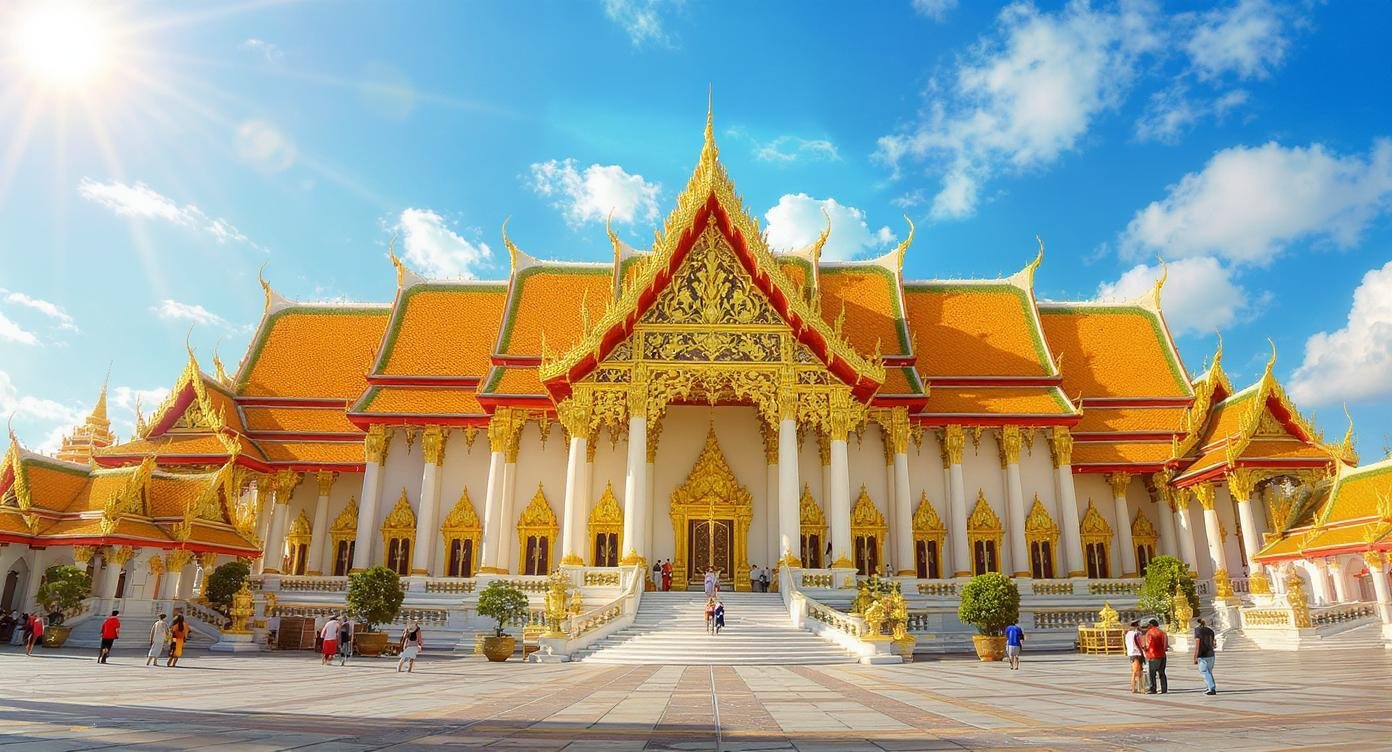Picture this: You’re strolling along the breezy riverfront of Phnom Penh just as the sun slips behind the Royal Palace, casting a golden glow across its shimmering spires. A few saffron-robed monks pass by, quiet and graceful, while the air fills with the mouthwatering scent of street food—lemongrass, grilled skewers, and fresh herbs mingling in the dusk. Kids are laughing beneath fluttering Cambodian flags, tuk-tuks buzz by, and somewhere in the distance, a temple bell chimes.
Welcome to Phnom Penh—a city alive with energy, rich in culture, and still wonderfully under-the-radar. While most tourists make a beeline for Angkor Wat or Cambodia’s southern beaches, this riverside capital offers something deeper. It’s a mosaic of ancient traditions, French colonial charm, and a resilient spirit that’s come through more than its share of hardship. After spending days wandering its golden pagodas, bustling markets, and heart-wrenching museums, I can tell you this: Phnom Penh isn’t just a stopover—it’s the soul of Cambodia.
👉 Book your Phnom Penh experience here
Why Visit Phnom Penh?
This city has heart. Set along the banks of the Mekong and Tonlé Sap Rivers, Phnom Penh fuses history with modern life in a way that’s raw, real, and beautiful. Whether you’re into temples, street food, or people-watching at a riverside café, there’s something here for every kind of traveler.
It’s a place where you’ll learn, reflect, and probably fall a little in love—with the culture, the food, and the stories etched into its streets.
A Glimpse Into the Past
Once nicknamed the “Pearl of Asia,” Phnom Penh was a thriving cultural hub before the horrors of the Khmer Rouge era in the 1970s brought it to its knees. But the city has come back strong. Today, you’ll find temples and French colonial buildings sitting side by side with modern cafes and lively night markets. It’s this contrast—this sense of survival and growth—that makes Phnom Penh so compelling.
Getting There
By Air
Phnom Penh International Airport (PNH) is your gateway to the city, just 10 km from the center. Direct flights connect it to Bangkok, Singapore, Ho Chi Minh City, and more. Once you land, hop in a tuk-tuk or book a taxi—it’s all part of the experience.
By Land or River
Feeling adventurous? Buses link Phnom Penh to Siem Reap, Battambang, and even Ho Chi Minh City. Or try a scenic boat ride down the Mekong River—you’ll get some unforgettable views along the way.
👉 Plan your arrival and city tours here
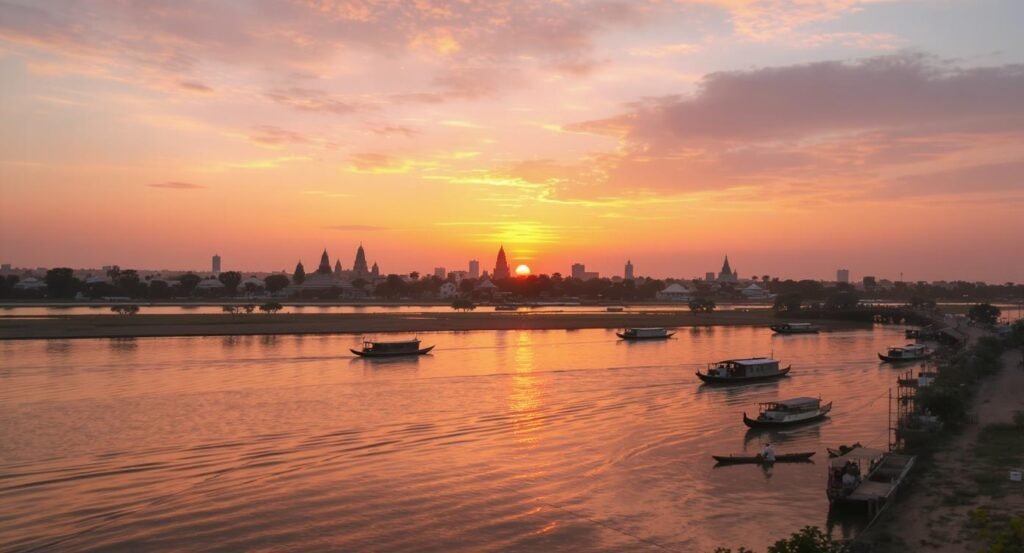
When to Go
Weather Overview
Phnom Penh has a tropical climate, meaning it’s hot and humid most of the year. The dry season (November to March) is the best time to visit, with cooler temperatures and clear skies.
Festivals and Events to Experience
Try to plan your trip around Cambodian New Year in April or the Water Festival in November. These vibrant celebrations offer a fantastic glimpse into Khmer traditions, complete with street parades, boat races, and local delicacies.
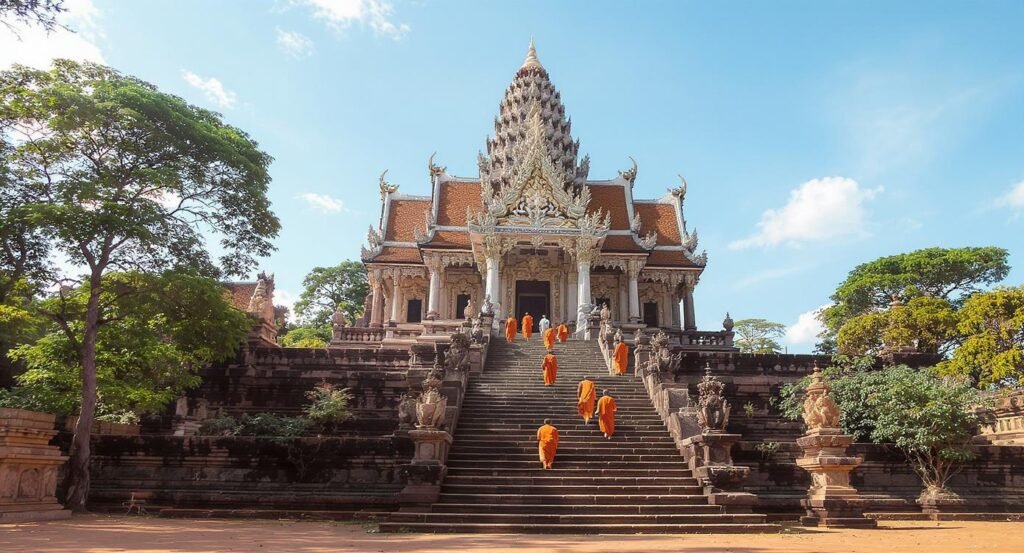
Top Things to See
Royal Palace and Silver Pagoda
The Royal Palace is the heart of Cambodia’s monarchy and a stunning example of traditional Khmer architecture. Inside, the Silver Pagoda gleams with its floor made of over 5,000 silver tiles.
Tuol Sleng Genocide Museum (S-21)
A sobering but essential visit, this museum documents the horrors of the Khmer Rouge regime. Once a school turned prison, it now serves as a powerful reminder of Cambodia’s past.
Choeung Ek Killing Fields
Located about 15 kilometers outside the city, this memorial site commemorates the lives lost during the genocide. The audio-guided tour is deeply moving and educational.
Wat Phnom
This hilltop temple offers panoramic views of the city and holds a significant place in Phnom Penh’s history and folklore. Legend has it that the city was named after a woman named Penh who found Buddha statues here.
👉 Skip the lines and book tickets/tours in advance
The Heartbeat of the Culture
Religious Practices
Buddhism is central to Cambodian life. Visitors are encouraged to dress modestly when visiting temples and show respect by removing shoes and hats.
Cultural Etiquette and Tips
Smiling is a big part of Khmer culture. It’s also customary to greet with a “Sampeah”—a slight bow with hands pressed together. Avoid touching someone’s head or pointing your feet at people or religious icons.
Where to Stay
Luxury Hotels
Phnom Penh boasts a range of upscale hotels like Rosewood, Sofitel, and Raffles. These offer top-tier comfort, river views, and elegant dining experiences.
Budget-Friendly Options
Affordable doesn’t mean sacrificing quality. Hotels like Okay Boutique and Villa Langka offer cozy accommodations with local charm.
Hostels and Guesthouses
Perfect for backpackers and solo travelers, hostels like Mad Monkey and Eighty8 offer dorms, private rooms, and social vibes.
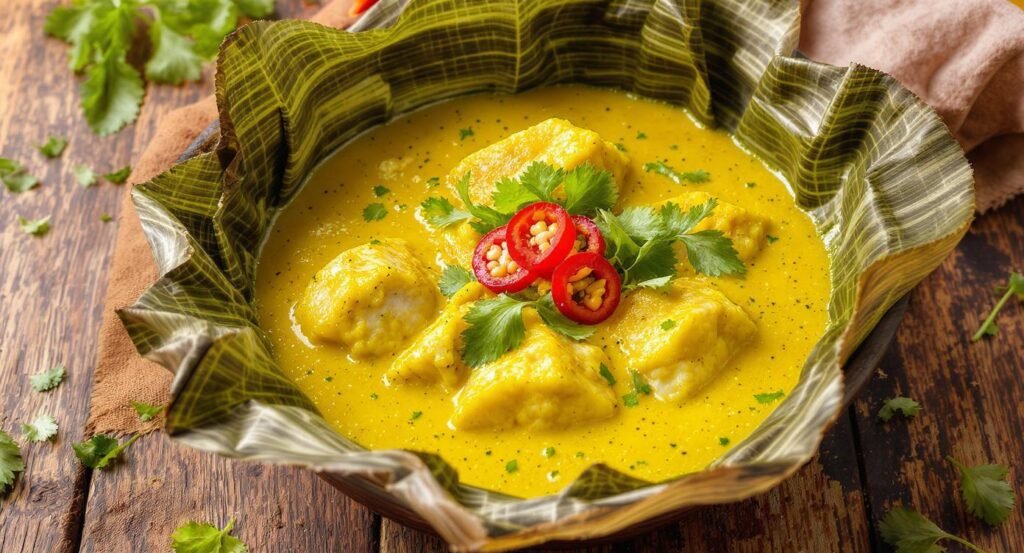
Food You’ll Dream About
Traditional Khmer Dishes
Don’t miss fish amok (a creamy curry steamed in banana leaves), lok lak (stir-fried beef), and nom banh chok (Khmer noodles). These dishes are full of flavor and cultural pride.
Street Food Delights
Explore Phnom Penh’s street food scene with treats like grilled skewers, fresh spring rolls, and palm sugar desserts. The Russian Market and Street 136 are good starting points.
Popular Restaurants and Cafés
Try Friends the Restaurant for a social enterprise dining experience or Malis for upscale Khmer cuisine. Coffee lovers will enjoy the city’s blossoming café culture with spots like Brown Coffee and Feel Good.
👉 Join a local food tour in Phnom Penh
Getting Around
Tuk-Tuks and Ride-Sharing Apps
Tuk-tuks are everywhere—fun, cheap, and convenient. You can also use apps like Grab or PassApp to avoid haggling and ensure fair prices.
Public Transit and Walking Routes
While public buses exist, they’re still developing. Walking is safe in central areas, especially along Riverside and BKK1, where most attractions cluster.
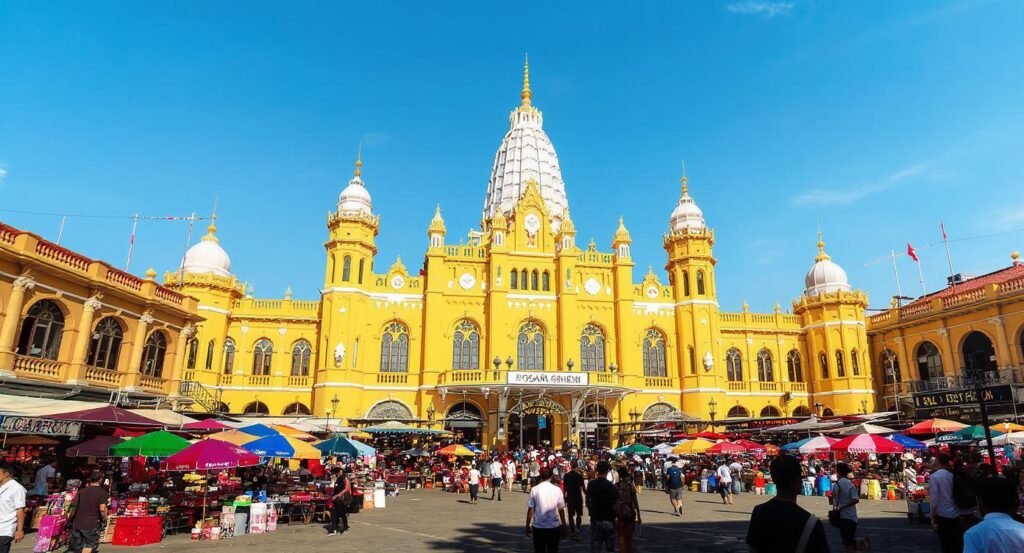
Shop Like a Local
Local Markets and Souvenirs
Check out Central Market (Psar Thmei) for handicrafts, textiles, and jewelry. Russian Market (Psar Tuol Tom Poung) is a treasure trove of souvenirs, clothes, and art.
Modern Malls and Boutiques
For a modern experience, AEON Mall offers international brands, a cinema, and great food courts. Explore local boutiques in BKK1 for handmade fashion and eco-friendly goods.
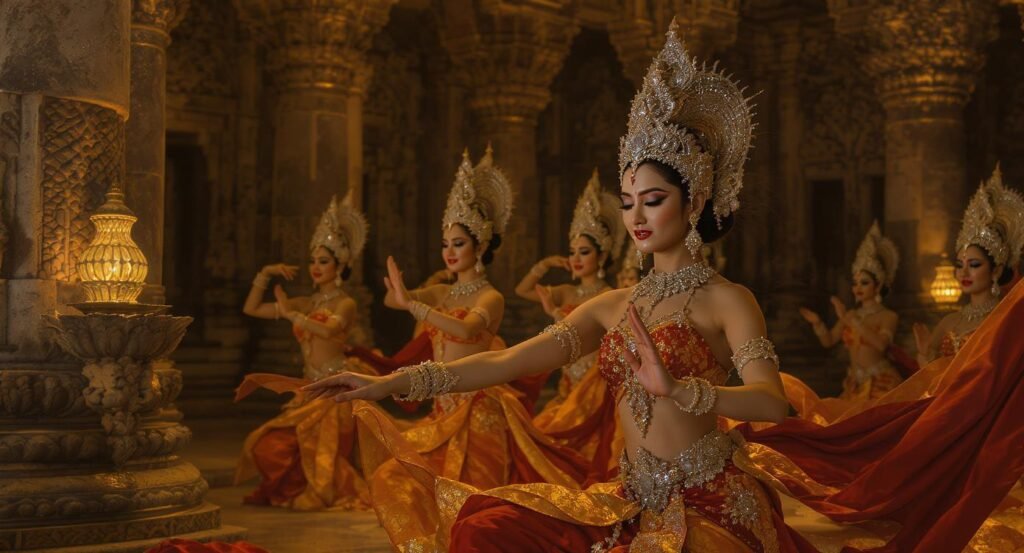
Nightlife + Entertainment
Best Bars and Pubs
From rooftop bars like Eclipse Sky Bar to riverside pubs, Phnom Penh has a relaxed yet lively nightlife. Bassac Lane is a popular strip for trendy bars and music.
Live Music and Cultural Shows
Enjoy traditional Apsara dance at Cambodian Living Arts or catch a live band at venues like Oscar’s on the Corner.
Easy Day Trips
Oudong Mountain
The former royal capital, Oudong offers scenic views, temples, and a spiritual vibe—just an hour’s drive from Phnom Penh.
Silk Island
Koh Dach, or Silk Island, is known for traditional silk weaving. Take a short ferry ride and spend a day cycling around the peaceful countryside.
👉 Take a guided day trip from Phnom Penh
Quick Tips for First-Time Visitors
Safety and Health Precautions
Phnom Penh is generally safe, but keep an eye on your belongings. Use bottled water and mosquito repellent. Travel insurance is highly recommended.
Currency and Budgeting
The US dollar is widely accepted, and ATMs are plentiful. A meal can range from $2 at a local stall to $25+ at high-end restaurants.
Useful Phrases and Language Tips
Khmer is the local language, but English is common in tourist areas. Learning a few phrases like “Hello” (Suosdei) and “Thank you” (Aw kohn) goes a long way.
FAQs
Q1. Is Phnom Penh safe for tourists?
Yes, just stay aware like you would anywhere else.
Q2. How long should I stay?
2–3 days gives you time to see the highlights and soak in the city’s vibe.
Q3. Do I need a visa?
Most travelers do, but the online e-visa process is quick and simple.
Q4. Is Phnom Penh expensive?
Not at all. You can travel well on under $30/day.
Q5. Vegetarian or vegan?
Plenty of options—especially in expat-friendly cafés and restaurants.
Embrace the Charm of Phnom Penh
Phnom Penh is a city that leaves a mark. It’s bold and beautiful, raw and refined, tragic and triumphant. Whether you’re sipping iced coffee by the river or standing quietly at the Killing Fields, you’ll feel something powerful here.Pack your bags and travel to Phnom Penh—it’s time to uncover Cambodia’s cultural heart.
មានដំណើរកំសាន្តល្អ!

